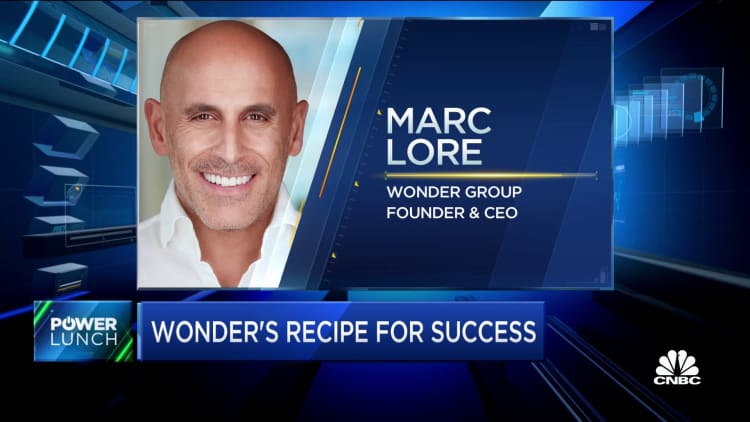Wonder Group, a food delivery startup, received funding from Nestle to expand its product offering to include prepared foods and high-tech kitchenware for use in hotels, hospitals, and sports arenas.
The agreement comprises a strategic partnership and a $100 million investment from Nestle, according to people familiar with the matter who wished to remain anonymous because the deal’s financial terms aren’t known.
Wonder and Nestle both acknowledged the agreement, but they would not provide any specifics.
With this funding, Wonder may be able to fulfill its goal of enabling working families to prepare healthy meals at home more quickly, easily, and affordably. Marc Lore, a serial entrepreneur and former head of Walmart’s e-commerce, founded the startup in 2018. When it closed a $350 million funding round in June, the company was valued at approximately $3.5 billion.
Wonder recently reached an agreement to pay $103 million to acquire Blue Apron, a meal kit provider. Additionally, it has created kitchen appliances that expedite and simplify the preparation of restaurant-caliber food.
Before Wonder, Lore created Jet.com, an online retailer that Walmart purchased in 2016 for a sum of $3.3 billion. Jet was eventually shut down by Walmart, but Lore oversaw the big-box retailer’s aggressive online strategy and race to catch up to rival Amazon. Over three years ago, he departed from Walmart.
Diapers.com’s parent company, Quidsi, was co-founded by Lore and was sold to Amazon.
Working with Nestle, according to Lore in a interview, will help Wonder grow faster.

Nestle is a massive food and beverage company that supplies grocery stores with ingredients, snacks, and frozen meals. It also operates a sizable food-service industry and supplies cruise lines and college campuses, among other customers. According to Lore, a few of those businesses might also be interested in Wonder’s kitchenware.
Nestle will manufacture pizza and pasta specially suited for Wonder’s kitchen appliances and sell the appliances to customers as part of the partnership.
Nestle’s president of out-of-home operations, Melissa Henshaw, stated that many of the company’s clients have found it difficult to stay competitive as consumers want quick meals and stronger flavors, but their establishments are understaffed to produce them. This has frequently resulted in adjustments that reduce sales potential and annoy patrons, such as condensed room service menus at hotels, shortened cafe hours, or bland, soggy, or cold food.
She stated, “With our partnership with Wonder, we have the opportunity to help operators across multiple out-of-home segments actually open up some additional revenue streams that have been pretty challenged post-pandemic and be able to improve their food quality and consistency.”
A fleet of trucks equipped with mobile kitchens that parked and prepared meals outside of customers’ homes in the suburbs of New Jersey and New York served as the foundation of Wonder’s very different business strategy. In January, it abandoned that strategy in an attempt to make a profit more quickly, laying off hundreds of workers.
Rather than continuing with its original plan, the startup decided to expand and started operating a network of physical kitchens where it could prepare menu items from various cuisines that patrons would typically find at highly popular restaurants or at the restaurants of celebrity chefs like José Andrés, Bobby Flay, and Michael Symon. Customers can mix and match by ordering entrees from four different restaurants for four different family members in a single order because it has acquired the rights from an increasing number of these chefs and restaurants.
There are presently 1,100 people working for the company.
Wonder intends to open ten stores in the tri-state region of New York, New Jersey, and Connecticut by the end of the year. There are roughly a dozen seats available for dine-in customers at each of those locations, but most orders are delivered or picked up for in-home dining, according to Lore. It intends to open at least 20 more locations the following year, he said.
In light of its recent growth, Wonder is offering other companies its white-labeled technology as well as the specially prepared and made meal ingredients that go along with it. The business-to-business product, Wonder Works, has already been launched in 50 locations, including theaters, airports, and convention centers.
In the end, Lore expressed his desire for Wonder to become a “super app for mealtime,” offering a range of tiers of options to accommodate users’ schedules, dietary requirements, and budgets. Hot meals from its kitchens and kits from Blue Apron would be among the options.
Wonder faces competition from a wide range of companies in the food industry. They include grocery stores like Kroger and Whole Foods, which is owned by Amazon, as well as quick-service restaurants like Sweet Green and Chipotle. Delivery services like Uber Eats and Door Dash have also increased their prepared food offerings.
In order to set itself apart from the competition, Wonder aims to improve the quality of its food and produce a wide range of dishes in a 2,800-square-foot kitchen using minimal labor and equipment.
“Gas is not present,” stated Lore. “The stove is absent. Nothing is on fire. The hoods are absent. Grease traps are not present. This can be used at Lens Crafters, a yoga studio, or a shoe store. It can enter anyplace. Thus, it enables you to be extremely flexible in the kitchen.
